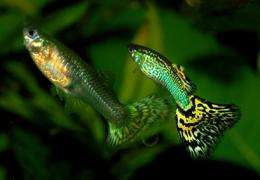Single gene controls fish brain size and intelligence

A single gene called Angiopoietin-1 (Ang-1) drives brain size and intelligence in fish according to a new study by researchers at UCL, Stockholm University and University of Helsinki.
Fish with larger brains and higher intelligence had higher expression of Ang-1, and when expression levels of Ang-1 were experimentally reduced, brains shrunk. These trends were seen in two unrelated species of fish - guppies (Poecilia reticulata) and zebra fish (Danio rerio) - indicating expression of Ang-1 is important for brain growth and development in fish generally.
The study, published today in Proceedings of the Royal Society B, identified the underlying genetics of natural variation in brain size and cognitive abilities in fish. Ang-1 could play an important role in the brain development of other vertebrates, including humans, but future research is required to establish this say the scientists involved.
Populations of guppies selected for either large or small brains, with associated differences in intelligence, were used for the first step in the study which was a complete genome analysis of differently expressed genes. There was a 10% difference in brain size between the large and small-brain guppies and from the genetic analysis, Ang-1 was identified as the only gene expressed at different levels in each replicate population. Further experiments in zebra fish by collaborator Professor Pertti Panula at Helsinki University confirmed that Ang-1 is a driver for brain size.
Professor Judith Mank, UCL Biosciences, said: "We were surprised to see that only a single gene was up-regulated in the large-brained guppies. Given the complexity of the brain, we expected that the genetics would be very intricate, but this suggests that changes in brain size are underpinned by relatively simple genetic mechanisms."
The protein encoded by Ang-1 is known to play an important role in growing new blood vessels and forming new brain cells in mice, which may indicate an important role of Ang-1 in brain growth of other animals, even in humans, say the scientists behind the study.
Dr Niclas Kolm, Stockholm University, said: "Other genes may be involved in brain growth in young, developing fish but no other genes were found to vary in their expression in adult fish other than Ang-1. Future studies will aim to investigate the role of Ang-1 and possibly other genes in the formation of differently sized brains in developing embryos".
Professor Mank added: "We don't yet know if Ang-1 is important in human brain development - it isn't on the list of genes typically studied in relation to human brain size - but as it plays a role in forming new blood vessels in humans, there may be a connection as large brains need a bigger blood supply, particularly during growth and for many brain functions. This presents us with an exciting opportunity to investigate the role of Ang-1 across different vertebrates."
The team now plans to study the age-specific genetic architecture of both brain structure and function based on new artificial selection experiments in the guppy.
More information: Expression change in Angiopoietin-1 underlies change in relative brain size in fish, rspb.royalsocietypublishing.or … .1098/rspb.2015.0872
Journal information: Proceedings of the Royal Society B
Provided by University College London


















